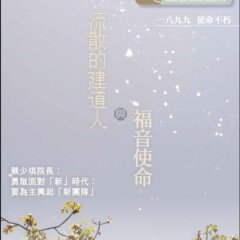唯名論與中道實相──比較奧康與智顗的思想/蘇遠泰
撮要
在現今多元主義的世代發展基督教的諸宗教神學,首先需要的是透過對話了解別宗教的信仰內容,欣賞其他宗教在教義與實踐方面的精彩之處。本文嘗試比較基督教與中國佛教在理解世間事物的本相這課題上的異同,對象分別是中世紀晚期唯名論神哲學家奧康,及中國本土佛教三宗之一的天台宗集大成者智顗。
作者嘗試先分析奧康對上帝兩種能力(絕對能力、規限能力)的理解,繼而探討唯名論哲學對共相的討論。根據奧康的理解,世間事物沒有獨立於上帝意志以外的本質,事物均是偶然的。在智顗方面,作者將以「一心三觀」的概念,開展天台宗的圓融三諦和覺悟解脫的觀念,提出事物的既無自性,但又非無,而是既有且空,既不有且不空的圓融思想。在結論部分,作者嘗試比較奧康與智顗對事物本相理解的異同,指出他們既同又不同之處,並提出對話雙方豐富彼此信仰詮釋的建議,作為宗教對話的真正目的。
ABSTRACT
An authentic religious dialogue is the key to success for developing the Christian theology of religions in this pluralistic era. Christianity needs to learn from the philosophies and practices of other religions, especially the Asian religions such as Buddhism. This article compares the understanding of the nature of entity between two religion giants. One is the famous medieval nominalist William of Ockham, and the other is the greatest Chinese T’ien-t’ai Buddhist Chih-i.
This article firstly discusses Ockham’s theory of the two powers of God (absolute power and ordained power). Then discussion of Ockham’s nominalism on universals will be given. Ockham tried to show that all entities were contingent and their existences were due to the will of God only. The concept of “threefold contemplation in one mind” of Chih-i is then discussed in details. The threefold truth, that is emptiness, conventional existence and middle, is perfectly integrated; and they are one-in-three and three-in-one. Besides, the soteriological dimension of the nature of entity will be explored. The author then compares the thoughts between Ockham and Chih-i and shows their similarity-in-difference. It is the author’s belief that mutual-enrichment should be the goal of all inter-religious dialogues. Thus, how Christian and Buddhist could enrich each other will be suggested in the conclusion.
原載於《建道學刊》16期(2001年7月),頁99-122。







